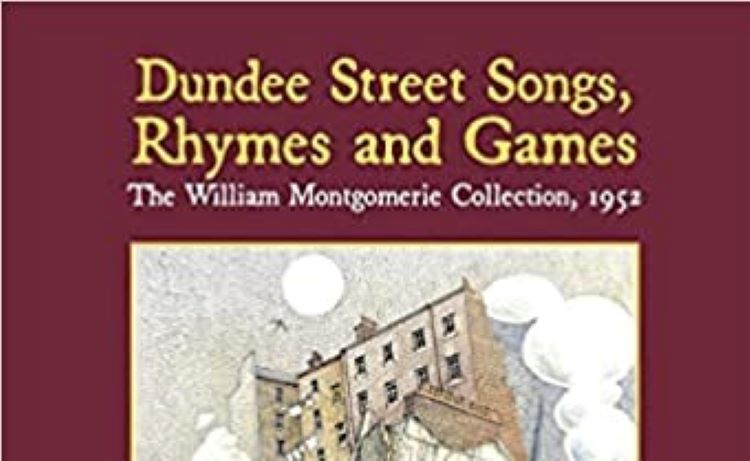Dundee Street Songs, Rhymes and Games: The William Montgomerie Collection, 1952
Introduced, edited and annotated by Margaret Bennett, and illustrated by Les McConnell
(Ochtertyre: Grace Note Publications, 2021)
William Montgomerie (1904-1994) was born in Glasgow, and spent many years as a teacher and a poet, living in Broughty Ferry on the eastern fringes of Dundee. He and his London-born wife, Norah Shargool, an illustrator working for newspaper and comic publisher D C Thomson, were fascinated by the music sung by children, and from the 1940s co-produced books of songs, rhymes and games of the children who played in the streets of Dundee. These books, vividly illustrated by Norah, used the Scots language in a period when this was widely discouraged in Scottish schools. William’s field recordings from the 1940s preserved the sounds of the voices of children from Hilltown (or rather, Hilltoon), Dundee, and this book includes an (optional) CD of some of this material, jointly produced by the Royal Conservatoire of Scotland (where Bennett teaches folksong and folklore) and the publishers. The original recordings sit in the Tobar an Dualchais (Kist o’ Riches) archive curated by the School of Scottish Studies at the University Edinburgh, and Bennett’s book helpfully provides catalogue reference numbers to these. Les McConnell’s vivid line drawings help modern readers to remember or imagine the original street contexts.
Norah and William Montgomerie’s collections included:
- Scottish Nursery Rhymes (1946)
- Sandy Candy and other Scottish Nursery Rhymes (1948)
- The Hogarth Book of Scottish Nursery Rhymes (1964)
- This Little Pig Went to Market: Play Rhymes for Infants and Young Children (1983)
Dundee Street Songs collects highlights from these publications. It includes a transcription of an interview between Norah Montgomerie and Bennett, a survey of the contribution made by the Montgomeries to the advocacy and preservation of Scots oral as well as literary culture, and details of 47 songs, rhymes and games with notes that clarify language and social contexts.
To ethnomusicologists today, the importance of children’s music is well recognised, highlighted by writers such as John Blacking as a key location of peer-to-peer oral transmission, occurring at an important life stage as children move from their immediate familial musicmaking into broader age-defined communities of practise. Within the British Isles, important fieldwork looking at (particularly English) schoolchildren at play before the age of mass social media was carried out by Iona and Peter Opie (e.g. The Lore and Language of Schoolchildren, OUP, 1959), and fieldwork that builds upon the Opies’ work on children’s historical musicking is well laid out in the British Library website under the ‘Playtimes’ project . The folksong index for English songs compiled by Steve Roud also contains some of this material, reflecting usages that cross the border. But Dundee Songs shows that the Montgomeries were at work even earlier than the Opies, and brings a Scottish and Scots focus to this knowledge and highlights the importance of children’s play to Scots culture generally and to Dundee more specifically. For some older readers, this will be the sound of their childhood.
Many adults wish that today’s children were as musically active as the Hilltown children recorded by William Montgomerie and sampled by this project. There is advocacy to encourage this in schools today, for example, from Scottish publishers like Matthew Fitt and James Robertson, whose publishing project Itchy Coo and work with schools around Scotland including Dundee has done much to encourage teachers and schoolchildren to recognise the poetic liveliness of their native Scots. Dundee Songs likewise encourages readers to continue their interest in this oral repertoire by providing a song index and suggestions for further reading and listening.
These interventions in cultural recovery are useful reminders to all-ages educators of the value of active musicking, albeit one that presents a poignant contrast with today’s digitally mediated musicking, when every child seems to have a phone in their hand rather than a skipping rope, or to be holding a games counsel rather than kicking a football. The publishers have kept the book at a very affordable cost to encourage practical application.
Details of how to purchase this book from Grace Note Publications is here.

